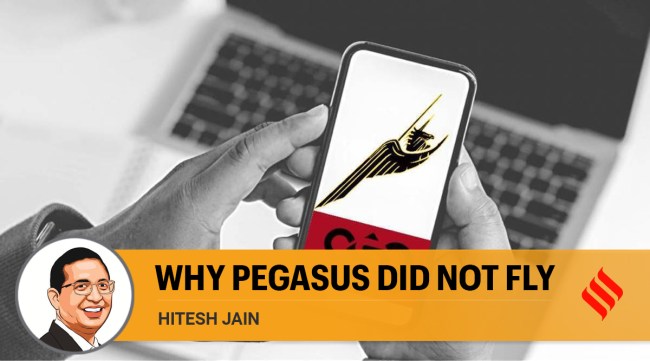Opinion Lesson from Pegasus: Let’s not jump the gun in mudslinging at Centre
Hitesh Jain writes: Supreme Court-appointed committee's report has settled the matter. But the way in which Pegasus issue was treated needs reflection
 Hitesh Jain writes: Almost six months after the committee was appointed by the SC to probe the allegations in the Pegasus matter, it submitted its report to the Court on August 2.
Hitesh Jain writes: Almost six months after the committee was appointed by the SC to probe the allegations in the Pegasus matter, it submitted its report to the Court on August 2. On July 18, 2021, a consortium of journalistic organisations from several nations, including one Indian portal, released a report which alleged that a spyware, Pegasus, targeted over 50,000 phone numbers worldwide and over 300 mobile phone numbers in India. This report sparked outrage across political and legal circles in India. Several opposition leaders viewed this as an opportunity to settle their political scores and wasted no time in hurling all sorts of accusations at the Centre. However, at the very outset, two aspects were strikingly unusual about this report, which claimed to be the culmination of a long investigative effort.
Firstly, it would be the most obvious course of action that when such grave allegations are raised, a detailed analysis is to be carried out to substantiate such allegations. In this case, although journalistic organisations claimed that more than 50,000 phone numbers were allegedly targeted by the Pegasus spyware, forensic tests were only carried out on 37 such phones. The question as to why forensic tests were apparently conducted on such a small number of phones remains unanswered. Further, the organisations involved failed to publish any details as to how such forensic tests were carried out. Rather, they merely expected one to believe that simply because telephone numbers were listed on a database, each and every phone number was subject to the spyware. Secondly, even the timing of these reports raised questions — they appeared a day before the Monsoon Session of Parliament in 2021.
Despite these glaring inconsistencies, several writ petitions came to be filed in the Supreme Court of India seeking an independent probe into the matter. During the court proceedings, although the Union of India’s hands were tied by the constraints of national security, it proposed the constitution of a committee of experts that would dive deep into the allegations raised regarding the usage of the Pegasus spyware. However, the Court rejected such a proposal on the ground that justice must not only be done, but it must also be seen to be done. Ultimately, considering multiple factors such as the impact on fundamental rights and the seriousness of the allegations levelled, the Court was compelled to get to the root of the matter. Hence, it appointed an expert committee whose functioning would be overseen by a retired judge of the Supreme Court.
Almost six months after the committee was appointed by the SC to probe the allegations in the Pegasus matter, it submitted its report to the Court on August 2. After examining this report, a three-judge bench led by the Chief Justice of India stated that no Pegasus spyware was found in the 29 devices examined by the committee. And, although there was some malware found in five of the devices submitted, the committee concluded that such malware too could not have been linked to Pegasus.
Aspersions were immediately cast on the functioning of the three-member expert committee as it issued a finding which was contrary to what the petitioners had sought. However, to dispel such aspersions and to uphold the rule of law, it is necessary to remind ourselves of the procedure adopted by the Court to appoint this committee in the first place. In its order dated October 27, 2021, the Court stated that it did not rely upon any government agencies while constituting this committee. Rather, it shortlisted expert members based on information collected independently as its objective was to select people who were not only free from ideological prejudice but were also independent and competent.
Therefore, what we observe is that initially, the Court accepted the prayers sought by the petitioner and appointed an independent committee to probe the Pegasus matter. Moreover, the Court took due care and consideration to ensure that the committee operated free from any government influence. Ultimately, it was this very committee which comprised of experts in the field of cyber security, digital forensics, networks, and hardware which concluded that out of the 29 devices submitted, Pegasus spyware was not found in any of them.
Although this turn of events indicates that the Pegasus issue is as good as closed, this whole episode raises two larger concerns. First, there exists a tendency to jump the gun on issues when one possesses limited information and to follow it up with unsubstantiated allegations and off-the-cuff remarks. Wouldn’t it be more appropriate if we let the law take its course? Second, in these times where there exists a constant need to score political brownie points, the focus is often steered away from the larger issue at hand, that is, the vulnerability of tech platforms. Wouldn’t it serve us better if we stay focused on the core issue and continue to strive for an open, safe, and accountable internet instead of indulging in needless political mudslinging?
The writer is a lawyer and vice-president, BJP Mumbai Pradesh




